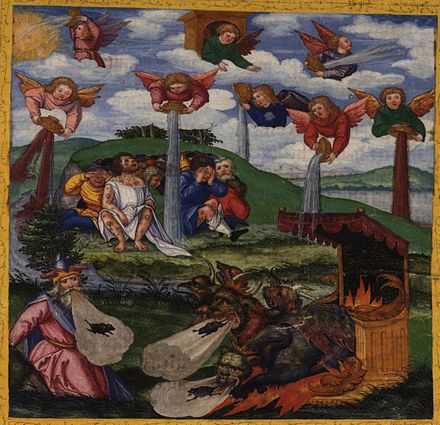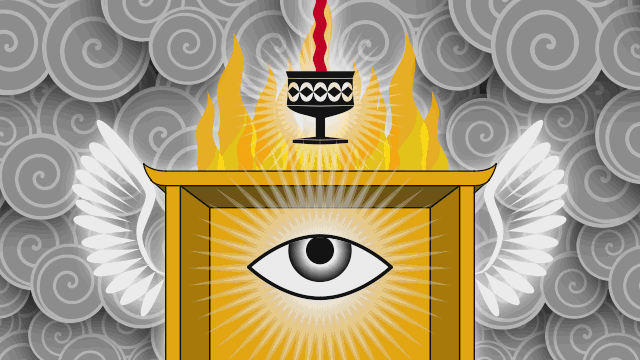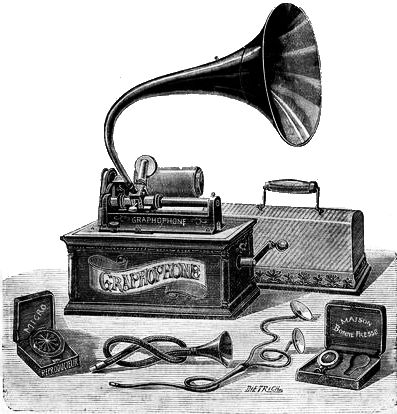Last week I went through the yellow pages of the telephone book and counted the number of Christian churches in Palo Alto. There are 36 of them, all claiming to be Christian. I did not even attempt to count the churches in the cities on the Peninsula. If we were to include all the cities that ring the Bay Area we would probably find that there are thousands of churches in this part of California alone.
Surely this forces the question upon us, "If all these churches were like the churches in the book of Acts, do you think life on the Peninsula would be different than it is today?" There is no doubt it would be tremendously different. The book of Acts lists a mere handful of churches, made up of slaves and working class people for the most part. As Paul said to the Corinthians, "There are not many mighty, not many rich among you," (1 Corinthians 1:26). Nevertheless there was such a dynamic at work in those churches that within 25 years after the day of Pentecost, when Paul and his companions, Timothy, Luke and Silas came to Thessalonika on the outskirts of the empire, the people sent a delegation to the city fathers saying, "These who have turned the world upside down have come here also," (Acts 17:6). It is recorded that the city fathers were very disturbed by the news. That was the impact of the early church.
What has happened in the meantime? Why are churches in general today so weak and ineffectual, having little impact upon society? Why is society degenerating while churches are increasing in number and in size? I agree there are dynamic churches here and there that are making an impact and reaching people. But we have to admit that churches like that are relatively rare. While this may sound like an oversimplification, I believe the reason for the change can be put in a very brief form: We have changed the strategy of the church. We no longer are operating as the Lord of the church instructed at the beginning. The church has filed away the original strategy and come up with one of its own which seems to be much more suitable for our day. That is why the church is steadily decreasing in power and influence.
Let us go back to the beginning, to the Upper Room discourse, where our Lord, the Founder of the church, describes to the original apostles the strategy that he plans to use. This is found in the sixteenth chapter of the Gospel of John, beginning with Verse 5. Actually it begins in the middle of verse 4. (Here we have one of those amazing paragraph divisions in the middle of a verse!)
There are five remarkable things that are part of this strategy, and here is the first of them. Jesus says:
"I did not say these things to you from the beginning, because I was with you. But now I am going to him who sent me; yet none of you asks me, 'Where are you going?' But because I have said these things to you, sorrow has filled your hearts. Nevertheless I tell you the truth: it is to your advantage that I go away, for if I do not go away, the Counselor will not come to you; but if I go, I will send him to you. And when he comes, he will convince the world concerning sin and righteousness and judgment: concerning sin, because they do not believe in me; concerning righteousness, because I go to the Father, and you will see me no more; concerning judgment, because the ruler of this world is judged." John 16:4b-11 RSV)
Everything is going to start, Jesus declares, with an inwardly transformed people. That is the first point in his strategy. It is easy to miss that when you read this paragraph. Most read the sentence, "When he comes he will convince the world concerning sin and righteousness and judgment," as though it is a ministry which the Spirit directly performs upon the unbelieving society. But that is not what this is saying. The important thing in this paragraph is to notice how the Spirit convinces the world because, as Jesus points out very carefully here, the Spirit does not come to the world.
Earlier in this discourse he had said, "The world cannot receive Him because it does not know Him," (John 14:17). Here he is careful to point out that, when the Spirit comes, he comes not to the world but to the church. He says twice in Verse 7: "If I do not go away, the Counselor will not come to you, but if I go I will send him to you." Thus what the Spirit does to the church is what is going to impress the world. That is the first point in the strategy of God.
What is the Spirit going to do to the church? To put it more personally, what is he going to do to you? Three things, Jesus says: He will convince the world of three things -- of sin, of righteousness, and of judgment. Our Lord goes on to elucidate on what he means.
First, he says, concerning sin "because they believe not on me." Unbelieving society, the secular system of our day does not believe in Jesus nor does it have any deep sense of its sin. Notice it does not say "sins" here, but "sin." The business of the church is not to convince the world of its sins but of its basic, fundamental sin.
Sin is a violation of God's intention for humanity. It is a destructive force that wrecks and ruins the full glory and beauty of humanity as God intended it to be. A mere glance at what is happening in society will convince you how true this is. I firmly believe that the Bay Area is the most beautiful, most enviable place on earth. I have traveled all over this globe and I have never found any place more desirable than this area. It has a marvelous climate -- neither too hot in summer nor too cold in winter. Spring comes in February, winter does not come until the middle of December, and even then it is very mild. The Peninsula, we are told, has the highest per capita income of any place in the world. Unemployment is relatively low. There is freedom here to follow any lifestyle you want. Yet people in this area are just as hurting, lonely, and miserable inside; life is just as empty and as painful as it is anywhere on earth. Why is that? It is because of sin. But they do not know that. They do not understand what causes all the pain, hurt, and loneliness. They ascribe it to a lot of different sources, but when those are corrected the same pain, the same emptiness remains.
So what do they learn from watching transformed people in the church? They learn that the reason for their pain is that they are out of touch with basic reality. They are trying to play the game of life without any reference to the One who sets the rules. The first thing they learn when they see people who have been inwardly transformed by the presence of the Spirit releasing to them the life of Jesus is that here are people who have found the secret of life. Here are people who like themselves have suffered all the hurt and the loneliness of life who now have found the secret of calmness, peace, and forgiveness. They discover for the first time that the nature of sin is to ignore the One in charge of life. "They sin because they do not believe in me," Jesus declares. The secret to life, therefore, is to believe in and come to the Lord Jesus.
The second thing the world will learn, Jesus says, is the source of the gift of wholeness. "Righteousness," he calls it, but righteousness is a term for what the Old Testament calls "holiness."
I confess I have never liked the word "holiness." When I was growing up I likened holiness to grimness. Holy people never smiled and never enjoyed anything. In fact, if they did enjoy anything, they felt guilty about it! I never liked this word until I learned to substitute for it another word that says exactly what holiness is, and that is the word "wholeness."
I have never met anybody who does not want to be a whole person. What do we mean when we sing "Holy, holy, holy"? God is "whole," he is perfect. There is nothing out of balance or eccentric about him. That is what he is seeking to produce in this world -- "whole" persons. That is what the word "righteousness" means.
The good news of the gospel is that we do not have to make ourselves whole. Everybody is born into this world with the idea that the way to be "whole" is to work at it until all the pieces fit and he finally gets himself together. Have you ever said to yourself, "I'm going to get myself together!" That is an expression of a desire for wholeness. What the world will learn from Christians is that the only way to find that wholeness is to come to Jesus. That is the first thing he gives you, an inner gift of wholeness. You are made righteous. Here is how Paul describes it in his second Corinthian letter. "He who knew no sin was made sin for us, that we might be made the righteousness of God in him," (2 Corinthians 5:21 KJV). That is it. The world will discover that the way to wholeness is to come to Jesus. This is done by means of the Spirit. That is what Jesus means when he says here, "because I go unto the Father and you see me no more." All along he has been saying that when he goes to the Father he will send the Spirit, and the first work of the Spirit is to give us what we could never earn -- righteousness, inner wholeness before God.
The Old Testament has a wonderful term for that: "The beauty of holiness." We are talking about inner beauty. One of my favorite psalms says, "Let the beauty of the Lord our God be upon us," (Psalms 90:17a KJV). There is something beautiful about whole people. They attract us, they capture our attention. The truly beautiful people, therefore, says Jesus, will be those who, despite all the failure and the weakness and the stumbling folly of their lives, have, by faith in Jesus, been made whole inwardly, and that inner wholeness then begins to transform, in a process, all of the outer life until they gradually reflect it in their behavior. That is what the world will learn.
Thirdly, Jesus declares, the world will learn judgment (not as the King James Version has it, "judgment to come"). It is true, there is a judgment day. We all must give account before God for the way we live. But that is not what he is saying here. He is not talking about the world learning that. That is a truth you learn after you come to Christ. But this is the truth of a judgment that has already happened: "The ruler of this world [Satan] is judged." All through this text Jesus has been referring to Satan in this way -- the one who is the leader behind the philosophy of the world, the invisible spirit who masterminds the psychology of non-Christians, distorting their thinking and leading them into illusions and wrong attitudes toward life. "The ruler of this world is judged."
What is Jesus talking about here? The word we would use to describe it is "liberty." The thing the world will learn by watching Christians is that here are people who have been set free, who know how to live, who are no longer bound by habits they cannot break. The Apostle Peter puts it this way, "Live as free men, but do not use your freedom as a pretext for evil," (1 Peter 2:16). This is what the Lord has come into our lives to do for us -- to set us free from all the bondage of the past.
There you have it. As the world observes what the Spirit does to Christians they will learn, first, the nature of reality: Jesus is behind all things. He is Lord of life. Secondly, they will learn that beauty starts from within: It is not painted on from without. It does not come by spraying, by painting, or by rubbing it on. It comes from within. And thirdly, they learn the true nature of liberty, to be a free person and to live as sons of the living God. That is the first step in the strategy of God. The second step follows.
"I have yet many things to say to you, but you cannot bear them now. When the Spirit of truth comes, he will guide you into all the truth; for he will not speak on his own authority, but whatever he hears he will speak, and he will declare to you the things that are to come. He will glorify me, for he will take what is mine and declare it to you. All that the Father has is mine; therefore I said that he will take what is mine and declare it to you." (John 16:12-15 RSV)
What a tender word this is in Verse 12. Right on the very threshold of the cross, facing the most terrible session of pain, personal hurt, and abandonment in his own life, Jesus sees the confusion, blindness and limited views of these men. He says to them, "I have yet many things to say to you, but you cannot bear them yet." That is one of the most encouraging words of Scripture.
When did he say these things? He is about to die. During the resurrection appearances he did not teach them for any length of time. Clearly he is looking on to the coming of the Spirit on the Day of Pentecost, and then the production of what we call the New Testament. In fact, it has been pointed out that, in Verse 13, the book of Acts is referred to. "When the Spirit of truth comes" -- that is the whole story of Acts, the Spirit moving out through the church into the world. Then beyond that is the writing of all the epistles: "He will guide you into all the truth." Not "all truth." There is no mathematical truth here, no truth about the cosmos or geography, but all "the" truth, the truth of redemption, the truth men need to know to fulfill their humanity. Here we can include all the epistles of the New Testament, the marvelous letters of Peter, James, John, Paul, the writer of Hebrews and others.
Further, Jesus says, "He will declare to you the things that are to come." That is the book of Revelation. So here is a preview of the New Testament from the lips of Jesus himself. Notice the character of it. It will be authoritative. The Spirit will not speak out of his own invention. Whatever the Father, the ultimate Voice in all the universe says is what you find in the pages of the New Testament. What an encouragement to believe what you find in this amazing book that gives the deep things of God, the thoughts of God and not of man! And it will be predictive. It will show the trend of the events of our day, the reason why they come into being and where it is all going to culminate.
Finally, it will be Christ-centered. Jesus will be glorified in it. As you study and read this guide book, you discover that Jesus is on every page of the Bible, Old and New Testament alike. He is the center of the universe and when you are in touch with him you are at the heart of everything. "In him are hid all the treasures of wisdom and knowledge," (Colossians 2:3). That is why it is so important for all of us to study this book, because it is the God-given process by which our knowledge of reality s increased.
Now the third thing. This is a rather extensive passage, running from Verse 16 through Verse 24, and it sounds a bit confusing at first. I will read it in two sections.
"A little while and you will see me no more; again a little while, and you will see me." (John 16:16 RSV)
What a strange thing to say: "I am going to disappear and you will never see me again, but in a little while you will see me." It puzzled the disciples.
Some of his disciples said to one another, "What is this that he says to us, 'A little while, and you will not see me, and again a little while, and you will see me'; and, 'because I go to the Father'?" They said, "What does he mean by 'a little while'? We do not know what he means." Jesus knew that they wanted to ask him; so he said to them, "Is this what you are asking yourselves, what I meant by saying, 'A little while, and you will not see me, and again a little while, and you will see me'?" John 16:17-20 RSV)
How well he knows them and how quickly he discerns the problem they were facing. This is a marvelous guide as to how to read the Scriptures. When we read these words we are often puzzled by them. Many people say that the New Testament contradicts itself, that it is filled with errors. That is exactly what these disciples are saying. "He contradicts himself. We do not understand this. First he says we are never going to see him again and then he says we are going to see him again. What does he mean?" But it makes perfect sense when you understand what he meant by this. The limitation is not in what he is saying -- there is no error in that -- it is in the understanding of these disciples. It is very helpful for us to remember that in reading Scripture.
He goes on to explain what he means here.
"Truly, truly, I say to you, you will weep and lament, but the world will rejoice; you will be sorrowful, but your sorrow will turn into joy. When a woman is in travail she has sorrow, because her hour has come; but when she is delivered of the child, she no longer remembers the anguish, for joy that a child is born into the world. So you have sorrow now, but I will see you again and your hearts will rejoice, and no one will take your joy from you. In that day you will ask nothing of me. Truly, truly, I say to you, if you ask anything of the Father, he will give it to you in my name. Hitherto you have asked nothing in my name; ask, and you will receive, that your joy may be full." (John 16:20-24 RSV)
What does he mean, "I am going away and you will see me no more, a little while and you will see me no more?" When we understand the facts of the crucifixion and of the resurrection, of course, we see what he means. He did indeed go away in the flesh. His earthly life, as we know life on earth, was over, and it would never be resumed again. So what he says is very true. "A little while and you will see me as I am no more, but in a little while you will see me." Here he is referring to the joy of that resurrection morning when they found him again with the marks of crucifixion still in his body, a glorified body, and in a different state, a different dimension of living. Our problem is that we do not understand these things. We see such a narrow, limited range of life, whereas God sees whole dimensions that are not visible to us. That is why we struggle with the revelation of Scripture. But Scripture is not wrong. Our own limited understanding is the problem. This is what the Lord makes amply clear to these disciples.
Do not miss the point he makes here in the words, "Your sorrow will turn into joy." Notice the way he puts that. He does not say, "After you have had a lot of sorrow, then I am going to give you some joy." That would be sequence -- joy after sorrow. No, what he is talking about is consequence: Your sorrow will actually be the very thing that causes you joy.
What a beautifully apt illustration he uses here. Every mother knows exactly what Jesus means when he talks about a woman in travail. Anybody who has watched, even on television, a woman in labor knows that the pain is very real. The anguish of birth can be a shattering thing. But when the baby is born the mother's face is filled with joy, peace, gladness -- even glory. Oftentimes in child dedication services I have the privilege of holding the babies. It can be a dangerous situation because some of them leak! But I have learned to not watch the baby, but rather focus on the joy and the pride in the eyes of the mothers. This is what Jesus said. What caused the mother's anguish? The baby. What causes her joy? The baby. This is the process we believers are going to go through again and again.
Notice that he links it all to prayer. He says, "In that day [in the day when the Spirit comes] you will ask nothing of me. [You do not need to come and ask me anything. You will not settle your curiosity or your puzzlement by coming to me, but you can go to the Father ...] if you ask anything of the Father, he will give it to you in my name. Hitherto you have never asked anything of me [they had not asked the Father in his name] but ask, in my name, and you will receive, that your joy may be full [the thing that once gave you sorrow will be turned into joy]." Paul confirms this in a beautiful passage in Philippians: "Be anxious for nothing, but in everything by prayer and supplication with thanksgiving, let your requests be made known unto God," (Philippians 4:6). And what? Everything will change? The circumstances will magically clear up? No. "... the peace of God that you cannot explain will guard your heart and mind in Christ Jesus," (Philippians 4:7). That is the answer. Your sorrow will be turned into joy. It will take awhile, it does not all happen overnight, but the very thing that caused your pain you will one day be grateful for. That is the promise of God.
That is so different from anything the world can do. The world's method of clearing up difficulty is to try to change the circumstance, but they never can quite succeed. All the protests and demonstrations, the angry threats, the well-intentioned attempts to try to correct the injustices of our day only seem to perpetuate them and make them worse at times. But God has a process by which when you bring it to him your sorrow will be turned into joy. That is the third step.
Then the fourth factor.
"I have said this to you in figures; the hour is coming when I shall no longer speak to you in figures but tell you plainly of the Father. In that day you will ask in my name; and I do not say to you that I shall pray the Father for you; for the Father himself loves you, because you have loved me and have believed that I came from the Father." (John 16:25-27 RSV)
"In that day" (the day of the Spirit, in which we now live), Jesus says, "I want you to know a great truth: the Father himself loves you." This is the underlying platform upon which our security rests. If you want to be a confident person the way to it is to remind yourself daily that, for no reason that you can discern -- in fact, against all the reasons that your guilty heart can present -- God loves you.
I well remember the story I once heard of the way D. L. Moody began a campaign in Cambridge University in England. Moody was a backwoods American preacher who could not speak English properly. It was said of him that he was the only man who could pronounce "Jerusalem" in one syllable. When the students of Cambridge learned that he was coming to this center of culture they were appalled and outraged. Some of them determined to wreck his service by cat-calls and mocking, so they sat right on the front row. Included in that group was the young man who, when he was an old man, told me this story. He said that when Moody came to the platform the first thing he did was look down at these young men. Addressing them directly, he said to them, "Young gentlemen, don't ever think God don't love you for he do!" They were so startled by that they sat there stunned. Moody went on to preach the love of God for a broken, hurting world. At the end of it, several of these young men, including the one who years later as an old man told me this story, came to Christ. That is the platform upon which all of our life rests: The undeserved love of God because of Jesus. "Because you have loved me."
Then the final factor.
"I came from the Father and have come into the world; again, I am leaving the world and going to the Father."
His disciples said, "Ah, now you are speaking plainly, not in any figure! Now we know that you know all things, and need none to question you; by this we believe that you came from God." (John 16:28-30 RSV)
Hear the confidence in that, the assurance that now they have a handle on everything? Jesus has stated the bare facts of the incarnation. "I came from the Father. I came into the world. I am leaving the world. I am going back to the Father." On hearing this the disciples brightened, nodded their heads and said. "Got it! Now we see it. You really are who you claim to be. You do not need us to question you to find out what is in our hearts. You know our hearts. You really are God, aren't you?" Implied in what they say is the feeling, "Now we have got the truth. Your teaching has finally gotten through to us. Now you can count on us."
Jesus answered them, "Do you now believe? The hour is coming, indeed it has come, when you will be scattered, every man to his home, and will leave me alone; yet I am not alone, for the Father is with me. I have said this to you, that in me you may have peace. In the world you have tribulation; but be of good cheer, I have overcome the world." (John 16:31-33 RSV)
I call that "God's folly recovery program." What he is saying to them is, "You think you know the truth. You have it in your head, but you have not yet got it in your heart. Within an hour, Peter, you are going to be slashing away with your sword in contradistinction to everything I have taught you, and all the rest of you are going to run for home and hide behind locked doors while I am facing my trial all alone. That is how dependable you are." But this is his final word, and what a wonderful word it is: "Be of good cheer, I have overcome the world." Out of weakness, we become strong. Out of mistakes and failure, trying to carry out this program, aware as we will be of the fact that we do not do it right, he has a way of correcting the mistakes, healing the foolishness, and bringing it all to pass anyhow.
These days I am working away in my garage building a table out of redwood. I have never made anything like that before. and I have to glue things together, smooth out the boards, etc. I found I am grateful for three things -- for plastic wood, sandpaper, and epoxy! This is what Jesus is offering these men. "I know you don't get it. I know it's hard to learn to operate this way. You will make mistakes, but be of good cheer, 'I have overcome the world.' I can even use your mistakes to advance my cause." That is an amazing strategy, but that is the explanation for the dynamics of the early church. How different this is than the philosophy of the world that says we have to succeed, we have to be sharp and competent, we can't make any mistakes, and, if we do, we are headed for failure and rejection.
But God's strategy is very different. Here are the five points of His strategy: First, an inner transformation, a healing within. Second, a reliable guidebook to refer to; third, a transforming access by which even our sorrows are turned into joy. Fourth, an unfailing platform of love upon which we can rest, knowing that no matter what we do God still loves us. Finally, a divine recovery program to straighten out all the mistakes we make.
When the church operates that way it is still a mighty power to change the world. But when we rely upon our own programs, our cleverly designed propaganda, our attempts to raise all the funds and train all the people to do things the way we think they ought to be done, while we may succeed in the eyes of the world, we may have impressive buildings and beautiful rituals, we make no impact on others around us. God's strategy alone can work.
(Ray Stedman, 

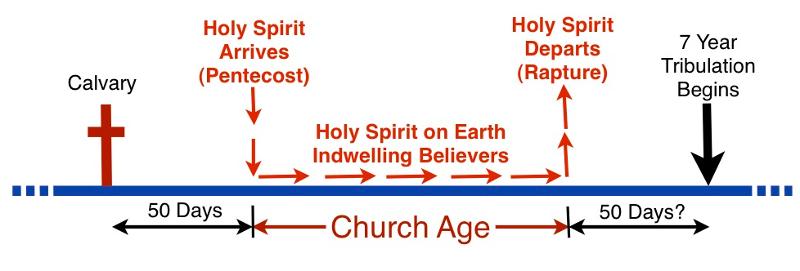



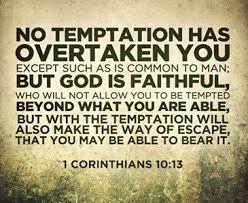
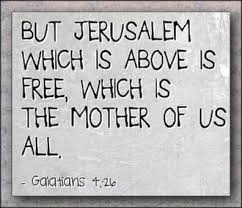
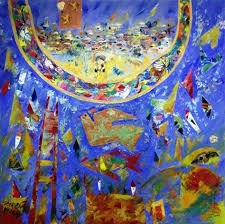
 ‘Yet now be strong, Zerubbabel,’ says the LORD; ‘and be strong, Joshua, son of Jehozadak, the high priest; and be strong, all you people of the land,’ says the LORD, ‘and work; for I am with you,’ says the LORD of hosts. ‘According to the word that I covenanted with you when you came out of Egypt, so My Spirit remains among you; do not fear!’
‘Yet now be strong, Zerubbabel,’ says the LORD; ‘and be strong, Joshua, son of Jehozadak, the high priest; and be strong, all you people of the land,’ says the LORD, ‘and work; for I am with you,’ says the LORD of hosts. ‘According to the word that I covenanted with you when you came out of Egypt, so My Spirit remains among you; do not fear!’ This is the word of the LORD to Zerubbabel:
This is the word of the LORD to Zerubbabel: